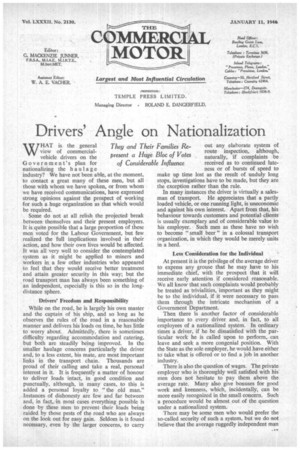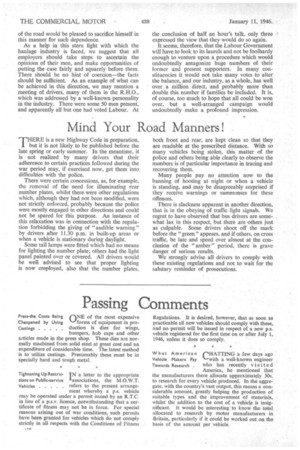Drivers' Angle on Nationalization
Page 19

Page 20

If you've noticed an error in this article please click here to report it so we can fix it.
WHAT is the general view of commercialvehicle drivers on the Government's plan for nationalizing the haulage industry? We have not been able, at the moment, to contact a great many of these men, but all those with whom we have spoken, or from whom we have received communications, have expressed strong opinions against the prospect of working for such a huge organization as that which would be required.
Some do not at all relish the projected break between themselves and their present employers. It is quite possible that a large proportion of these men voted for the Labour Government, but few realized the full implications involved in their action, and how their own lives would be affected. It was all very well to consider the contemplated system as it might be applied to miners and workers in a few other industries who appeared to feel that they would receive better treatment and attain greater security in this way; but the road transport man has always been something of an independent, especially is this so in the longdistance sphere.
Drivers' Freedom and Responsibility While on the road, he is largely his own master and the captain of his ship, and so long as he observes the rules of the road in a reasonable manner and delivers his loads on time, he has little to worry about. Admittedly, there is sometimes difficulty regarding accommodation and catering, but both are steadily being, improved. In the smaller haulage concerns particularly the driver and, to a less extent, his mate, are most important links in the transport chain. Thousands are proud of their calling and take a real, personal interest in it. It is frequently a matter of honour to deliver loads intact, in good condition and punctually, although, in many cases, to this is added a personal loyalty to "the old man." Instances of dishonesty are few and far between and, in fact, in most cases everything possible is done by these men to prevent their loads being raided by those pests of the road who are always on the look out for easy gain. Seldom is it found necessary, even by the larger concerns, to carry Out any elaborate system of route inspection, although, naturally, if complaints be received as to continued lateness or of bursts of speed to make up time lost as the result of unduly long stops, investigations have to be made, but they are the exception rather than the rule.
In many instances the driver is virtually a salesman of transport. He appreciates that a partly loaded vehicle, or one running light, is uneconomic and against his own interest. Apart from that, his behaviour towards customers and potential clients is usually exemplary and of considerable value to his employer. Such men as these have no wish to become "small beer" in a colossal transport organization, in which they would be merely units in a herd.
Less Consideration for the Individual At present it is the privilege of the average driver to express any grouse that he may have to his immediate chief, with the prospect that it will receive early attention if considered reasonable. We all know that such complaints would probably be treated as trivialities, important as they might be to the individual, if it were necessary to pass them through the intricate mechanism of a Government Department.
Then there is another factor of considerable importance to every driver and, in fact, to all employees of a nationalized system. In ordinary times a driver, if he be dissatisfied with the particular work he is called upon to perform, can leave and seek a more congenial position. With the State as the sole employer, he would have either to take what is offered or to find a job in another industry.
There is also the question of wages. The private employer who is thoroughly well satisfied with his men does not hesitate to pay them above the average rate. Many also give bonuses for good work and keenness, which, incidentally, can be more easily recognized in the small concern. Such a procedure would be almost out of the question under a nationalized system.
There may be some men who would prefer the so-called security of such a system, but we do not believe that the average ruggedly independent man of the road would be pleased to sacrifice himself in this manner for such dependence.
As a help in this stern fight with which the haulage industry is faced, we suggest that all employers should take steps to ascertain the opinions of their men, and make opportunities of putting the case fairly and squarely before them. There should be no hint of coercion—the facts should be sufficient. As an example of what can be achieved in this direction, we may mention a meeting of drivers, many of them in the R.H.O., which was addressed by a well-known personality in the industry. There were some 50 men present, and apparently all but one had voted Labour. At the conclusion of half an hour's talk, only three expressed the view that they would do so again.
It seems, therefore, that the Labour Government will have to look to its laurels and not be foolhardy enough to venture upon a procedure which would undoubtedly antagonize huge numbers of their former and present supporters. In many constituencies it would not take many votes to alter the balance, and our industry, as a whole, has well over a million direct, and probably more than double this number if families be included. It is, of course, too much to hope that all could be won over, but a well-arranged campaign would undoubtedly make a profound impression.




























































